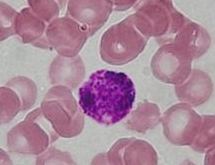Basopenia
Editor-In-Chief: Prab R Tumpati, MD
Obesity, Sleep & Internal medicine
Founder, WikiMD Wellnesspedia &
W8MD medical weight loss NYC and sleep center NYC
| Basopenia | |
|---|---|
| Synonyms | Basophilic leukopenia |
| Pronounce | N/A |
| Specialty | N/A |
| Symptoms | Often asymptomatic, may be associated with allergic reactions, infections, or endocrine disorders |
| Complications | Increased risk of infection |
| Onset | Variable, depending on underlying cause |
| Duration | Depends on underlying cause |
| Types | N/A |
| Causes | Allergic reactions, hyperthyroidism, stress, infection, corticosteroid use |
| Risks | Autoimmune disorders, chronic stress, endocrine disorders |
| Diagnosis | Complete blood count showing low basophil count |
| Differential diagnosis | Leukopenia, neutropenia, eosinopenia |
| Prevention | Managing underlying conditions, reducing stress |
| Treatment | Addressing underlying cause, immunotherapy if related to allergies |
| Medication | N/A |
| Prognosis | Generally good if underlying cause is treated |
| Frequency | Rare |
| Deaths | N/A |
Basopenia is a condition characterized by abnormally low numbers of basophils in the blood. Basophils are a type of white blood cell that play a crucial role in the body's immune response. They are responsible for releasing chemicals that help control the body's reaction to inflammation and allergies.
Causes[edit | edit source]
Basopenia can be caused by a variety of factors, including:
- Acute infection: During an acute infection, the body may redirect basophils to the site of infection, resulting in a decrease in the number of these cells in the blood.
- Hyperthyroidism: This condition, which involves an overactive thyroid gland, can lead to basopenia.
- Stress: Physical or emotional stress can cause a temporary decrease in basophils.
- Corticosteroid use: These medications can lower the number of basophils in the blood.
Symptoms[edit | edit source]
Basopenia itself does not cause symptoms. However, the underlying condition causing basopenia may cause symptoms. For example, hyperthyroidism can cause symptoms such as weight loss, increased heart rate, and anxiety.
Diagnosis[edit | edit source]
Basopenia is typically diagnosed through a complete blood count (CBC) test. This test measures the number of different types of cells in the blood, including basophils.
Treatment[edit | edit source]
Treatment for basopenia typically involves addressing the underlying cause. For example, if basopenia is caused by hyperthyroidism, treatment may involve medication to regulate the thyroid gland.
See also[edit | edit source]
Search WikiMD
Ad.Tired of being Overweight? Try W8MD's physician weight loss program.
Semaglutide (Ozempic / Wegovy and Tirzepatide (Mounjaro / Zepbound) available.
Advertise on WikiMD
|
WikiMD's Wellness Encyclopedia |
| Let Food Be Thy Medicine Medicine Thy Food - Hippocrates |
Translate this page: - East Asian
中文,
日本,
한국어,
South Asian
हिन्दी,
தமிழ்,
తెలుగు,
Urdu,
ಕನ್ನಡ,
Southeast Asian
Indonesian,
Vietnamese,
Thai,
မြန်မာဘာသာ,
বাংলা
European
español,
Deutsch,
français,
Greek,
português do Brasil,
polski,
română,
русский,
Nederlands,
norsk,
svenska,
suomi,
Italian
Middle Eastern & African
عربى,
Turkish,
Persian,
Hebrew,
Afrikaans,
isiZulu,
Kiswahili,
Other
Bulgarian,
Hungarian,
Czech,
Swedish,
മലയാളം,
मराठी,
ਪੰਜਾਬੀ,
ગુજરાતી,
Portuguese,
Ukrainian
Medical Disclaimer: WikiMD is not a substitute for professional medical advice. The information on WikiMD is provided as an information resource only, may be incorrect, outdated or misleading, and is not to be used or relied on for any diagnostic or treatment purposes. Please consult your health care provider before making any healthcare decisions or for guidance about a specific medical condition. WikiMD expressly disclaims responsibility, and shall have no liability, for any damages, loss, injury, or liability whatsoever suffered as a result of your reliance on the information contained in this site. By visiting this site you agree to the foregoing terms and conditions, which may from time to time be changed or supplemented by WikiMD. If you do not agree to the foregoing terms and conditions, you should not enter or use this site. See full disclaimer.
Credits:Most images are courtesy of Wikimedia commons, and templates, categories Wikipedia, licensed under CC BY SA or similar.
Contributors: Prab R. Tumpati, MD


